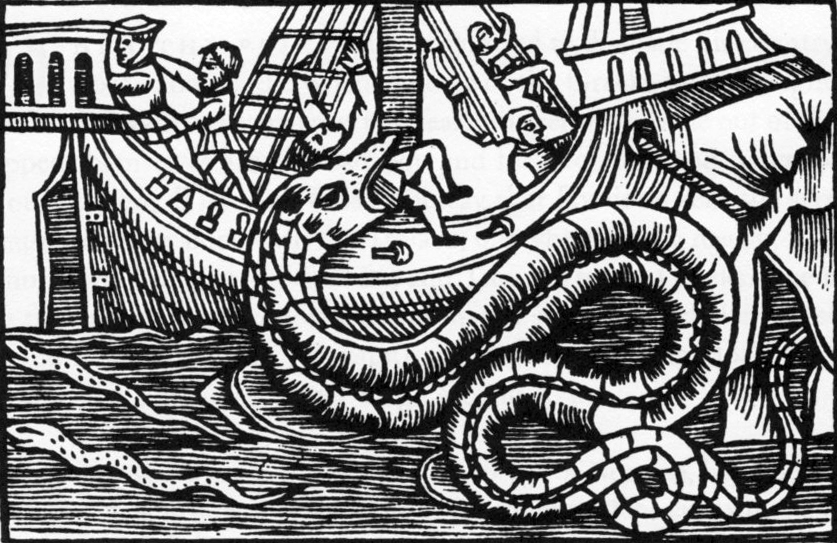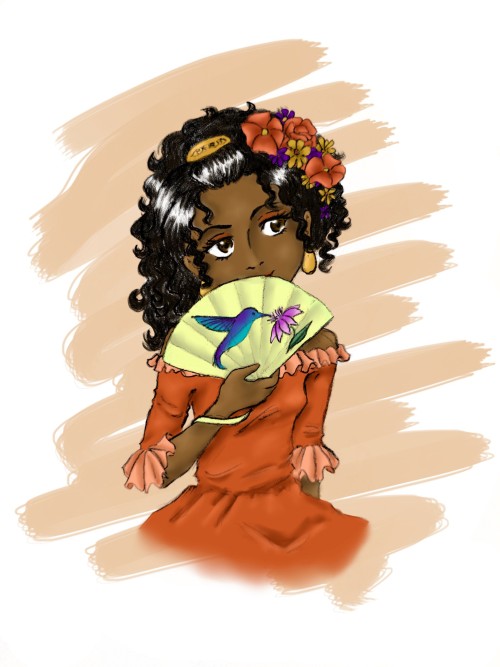Read the previous entry in the series here.
Read the next entry in the series here.
The succeeding chapter, “Compromises,” begins with Keffria and Rache working on a dress for Malta in preparation for a formal event. Malta complies willingly enough, although she chafes at their straitened circumstances. Conversation turns to Reyn and the lack of contact from the Khuprus family, and Malta finds herself obliged to consider the fact that every man on whom she has thought to rely has abandoned her when she has had need. She determines to enter the coming event, a ball at which she will be presented as a young adult, on her own; Keffria questions the propriety, but Ronica affirms the gesture.

Jek, Althea and Amber by Lalawu29 on DeviantArt, used for commentary
Althea walks the liveship docks in Bingtown, hampered by the skirt she wears as a bare concession to propriety while in town. She and the liveship Kendry confer, the ship offering to take a message to Grag Tenira along the next run up the Rain Wild River. They confer regarding the Paragon, with the Kendry remarking that the general liveships’ opinion is that the Paragon is to blame for many of the troubles that have befallen the ship.
Althea reflects upon the work done to ready the Paragon, no small amount of it driven by Amber’s influence over various sectors of the Bingtown population. She also notes that Brashen has hired a first mate of his own choosing, a brute named Lavoy, and that she has been assigned as second mate in the meantime. Amber, too, will sail aboard the Paragon, having earned the right and been assigned as the ship’s carpenter; Jek, a woman from the Six Duchies, will also join the crew. Althea considers the strange and uncomfortable circumstances, which extend to the crew, as she boards the Paragon and reports to Lavoy. He orders her to see to stowing cargo with a crew of six; she takes it for the challenge it is, and goes below, working with her crew to arrange the incoming supplies to their best effect. She assesses the crew as she works, noting problems and bright spots, and Lavoy finds himself pleased with his subordinate’s work. When, at length, Althea is done, she reports to the captain, Brashen, noting her concerns; Brashen notes his plan to address them, with Paragon putting in darkly.
In the Rain Wilds, the Khuprus family confers, with Reyn rebuked by his older brother Bendir and Jani not entirely pleased with either. Bendir comments about the family finances, occasioning sharp comments from Reyn, in turn, and Jani steps in to reassert her authority over both of her sons. Some of the source of the Paragon‘s troubles is remarked upon; the ship was built from “mixed plank,” making it inherently unstable, and the likely over-loading of the ship by the Ludluck Traders did the rest. So is the threat of piracy coming to the Rain Wild River, with the Vivacia confirmed to be in Kennit’s hands and the Ringsgold rumored to be vanished. Reyn rages against the continued depredations of the Satrap and against Bendir’s reluctance to lead resistance. Jani, surprisingly, agrees with Reyn, and plans to foment rebellion begin. Reyn also tries to argue for access to the dragon that speaks in his mind, unsuccessfully, though an arrangement is reached that allows him some freedoms in exchange for his relinquishing claim on the last remaining wizardwood log. After Reyn agrees to the terms and departs, Jani confers with Bendir, bidding him dispose of the dragon once Reyn is away.
At night, Amber confers with the anchored Paragon. The ship voices concerns about being unable to see and asks about Amber’s work on the Ophelia‘s hands. Paragon presses Amber to recarve the figurehead into a new form that can see; she is hesitant to make the attempt, fearful of working badly or doing worse, but she agrees to consider the work.
The attitude towards blame in the present chapter is of interest. Malta notes that her father’s absence may not be his fault, but it is still felt, and she must still move away from relying on others. The liveships believe the Paragon caused the problems that befell, while the Khuprus family knows some of the blame for the ship and its situation is theirs–though they do not admit to all of it. Rereading, I am put in mind of the talk of “personal responsibility” that crops up every so often, usually when there is some motion towards addressing systemic inequities that have and have had generational impacts. And I remain uncertain how best to respond to such things, although I note that 1) not everyone has the capability of choosing well and 2) a person may well choose from a menu without being the one who sets the menu. You’re not likely to get sushi at a burger joint, after all, and if you didn’t drive…
I’ve also had to replace my computer; help offset the cost so I can keep doing this for you?











